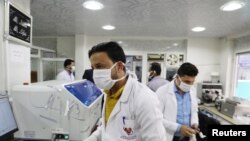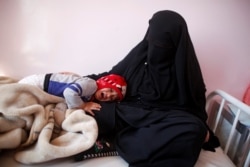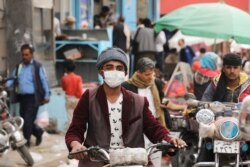Yemen's brutal civil war has entered its fifth year with no serious prospects for its end and concerns over what could happen should there be a coronavirus outbreak. While COVID-19 has not been detected in Yemen, one humanitarian group says it has been unable to delivery aid where authorities have imposed strict measures to halt the spread of the virus.
Yemen is already home to the world’s worst humanitarian crisis, according to the United Nations, and so humanitarian organizations warn that a coronavirus outbreak there would be tragic.
Since 2016, Yemen has struggled with a suspected 1.3 million cholera cases. Such cases are expected to rise for years to come because of “ongoing conflict and a fragile health system,” according to the U.N.
Sultana Begum is Yemen advocacy manager for the Norwegian Refugee Council. She tells VOA that Yemenis will find it hard to protect themselves against the COVID-19 pandemic as fighting continues to rage between Saudi-backed government forces and Iranian-supported Houthi rebels.
“We are extremely, extremely concerned about any possible outbreak because it will have catastrophic consequences for displaced people," she said. "After five years of war there have been a lot of damage and destruction to thousands of hospitals, water and sanitation systems. On top of that, Yemen was already reeling from other diseases like dengue fever and cholera. We have a lot of displaced people who lack access to water, health care. Even washing your hands is very difficult when living in desert-like, overcrowded camps. Never mind self-isolating.”
There is also alarm over the Houthi rebels’ use of shutting down schools, citing COVID-19 concerns. Gulf analyst Cinzia Bianco of the European Council on Foreign Relations says this is just the latest ploy by the Houthis to enlist more recruits as their fighting intensifies both in the Marib region and near the Saudi border.
Bianco tells VOA that she expects to see the coronavirus also impact the ability of parties on both sides of the conflict to wage war.
"So, I think it will spread quite quickly and in three months’ time we will see a peak level of contagion in Yemen to a point that it will definitely and necessarily impact also political groups, militias and everyone who is involved in the war," she said.
British Yemen expert Helen Lackner says she doesn’t think much can be done to protect the Yemenis from the coronavirus. Both the Houthi rebels and United Arab Emirates-backed southern separatists, she says, are preventing precautionary measures from being put into place.
“The southern forces in Aden have prevented WHO [World Health Organization] supplies from being left out of the airport so they could reach government people. That’s a lot of serious supplies," she said. "The so-called quarantine areas set up in Houthi areas, which are doing anything except protecting anyone from anything. On the contrary, they are disease breeding grounds.”
Citing published reports, Lackner tells VOA that the UAE-backed southern separatists prevented 81 ambulances and 15 mobile health clinics from being released to combat disease.






